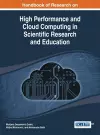
Handbook of Research on High Performance and Cloud Computing in Scientific Research and Education
3 contributors - Hardback
£354.00
Marijana Despotović-Zrakić received her BS degree at the Faculty of Organizational Sciences, University of Belgrade in 2001 and a MSc degree in 2003. She received her PhD degree with the thesis “Design of methods for postgraduate e-education based on Internet technologies” in 2006. Since 2001, she has been teaching several courses at the Faculty of Organizational Sciences: E-business, E-education, Simulation and simulation languages, Internet technologies, Internet marketing, Risk management in information systems, M-business, and Internet of things. She has been an Associate Professor since 2011. Her current professional and scientific interests include software project management, information systems, Internet technologies, and e-education.
Veljko Milutinović is a Dr. Professor at the School of Electrical Engineering, University of Belgrade, Serbia. During the ‘80s, for about a decade, he was on the faculty of Purdue University in the USA, where he co-authored the architecture and design of the world's first DARPA GaAs microprocessor. During the ‘90s, after returning to Serbia, he took part in teaching and research at a number of major EU schools. He also delivered lectures at Stanford and MIT and has about 20 books published by leading publishers in the USA. He is on the Scientific Advisory Boards (SAB) of Maxeler Supercomputing, London, England, and Technology Connect of Boston, USA. Dr. Milutinovic is a Fellow of the IEEE and a Member of Academia Europaea.
Aleksandar Belić is a Research Professor and Director of Institute of Physics, University of Belgrade, Serbia. He received his PhD at University of Illinois at Urbana in 1991 with thesis “Deep Inelastic Scattering by Quantum Liquids,” fellowships from Serbian Academy of Sciences and Arts, University of Illinois, and F. T. Adler Fellowship. He was vice-president of Serbian Physical Society and Assistant Minister in Ministry of Science of the Republic of Serbia from 2000 to 2004. Since 2004, he has been the Head of Scientific Computing Laboratory. The unifying theme in his research is the application of high performance computing resources as simulation tools used to gain insight into behaviour and evolution of complex many-body systems. His research interests include various topics in the investigation of complex systems with many degrees of freedom, quantum Monte Carlo simulations, novel methods of calculation of path integrals and compactification of granular systems.